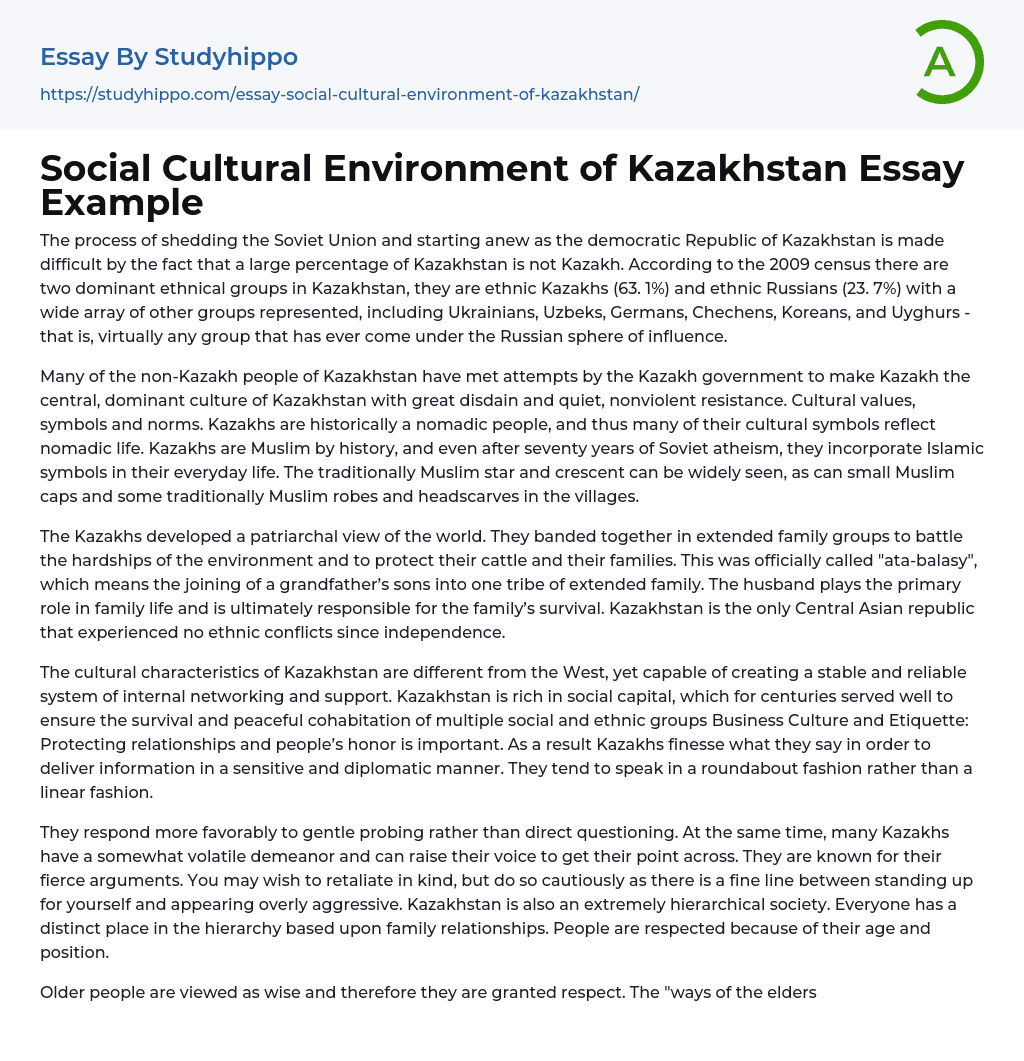The process of shedding the Soviet Union and starting anew as the democratic Republic of Kazakhstan is made difficult by the fact that a large percentage of Kazakhstan is not Kazakh. According to the 2009 census there are two dominant ethnical groups in Kazakhstan, they are ethnic Kazakhs (63. 1%) and ethnic Russians (23. 7%) with a wide array of other groups represented, including Ukrainians, Uzbeks, Germans, Chechens, Koreans, and Uyghurs - that is, virtually any group that has ever come under the Russian sphere of influence.
Many of the non-Kazakh people of Kazakhstan have met attempts by the Kazakh government to make Kazakh the central, dominant culture of Kazakhstan with great disdain and quiet, nonviolent resistance. Cultural values, symbols and norms. Kazakhs are historically a nomadic people, and thus many of their cultural symbols reflect nomadic life
.... Kazakhs are Muslim by history, and even after seventy years of Soviet atheism, they incorporate Islamic symbols in their everyday life. The traditionally Muslim star and crescent can be widely seen, as can small Muslim caps and some traditionally Muslim robes and headscarves in the villages.
The Kazakhs developed a patriarchal view of the world. They banded together in extended family groups to battle the hardships of the environment and to protect their cattle and their families. This was officially called "ata-balasy", which means the joining of a grandfather’s sons into one tribe of extended family. The husband plays the primary role in family life and is ultimately responsible for the family’s survival. Kazakhstan is the only Central Asian republic that experienced no ethnic conflicts since independence.
The cultural characteristics of Kazakhsta
are different from the West, yet capable of creating a stable and reliable system of internal networking and support. Kazakhstan is rich in social capital, which for centuries served well to ensure the survival and peaceful cohabitation of multiple social and ethnic groups Business Culture and Etiquette: Protecting relationships and people’s honor is important. As a result Kazakhs finesse what they say in order to deliver information in a sensitive and diplomatic manner. They tend to speak in a roundabout fashion rather than a linear fashion.
They respond more favorably to gentle probing rather than direct questioning. At the same time, many Kazakhs have a somewhat volatile demeanor and can raise their voice to get their point across. They are known for their fierce arguments. You may wish to retaliate in kind, but do so cautiously as there is a fine line between standing up for yourself and appearing overly aggressive. Kazakhstan is also an extremely hierarchical society. Everyone has a distinct place in the hierarchy based upon family relationships. People are respected because of their age and position.
Older people are viewed as wise and therefore they are granted respect. The "ways of the elders" is a popular expression that is used to explain why things are done in prescribed ways. Kazakhs expect either the eldest or the person with the highest position to make decisions that are in the best interest of the group. An indirect style of communication tends to be more effective than being overly direct, although Soviet influenced bluntness still remains strong—your weight and level of attractiveness tend to be fair game for comments.
Celebrated Holidays: Some
of the principal secular celebrations are 8 March, Women's Day, a very important day in Kazakhstan and celebrated by all. Women are honored on this day and showered with flowers and entertained with skits and jokes by their male coworkers and family members. Narooz, Kazakh New Year—a holiday mainly celebrated by Kazakhs on 22 March, but also observed by Kyrgyz, Uzbeks, Turkmen, Iranians. It occurs on summer solstice. Kazakhs cook traditional foods, have horse races, and set up many yurts.
Victory Day on 9 May commemorates the Soviet victory over Nazi Germany. Day of the Republic, 25 October, was the day independence was declared. This day is a day of Kazakh nationalism, with many speeches, songs, and performances in Kazakh. Independence Day is celebrated on 16 December—this date was chosen to remember the riots in Almaty on 16 December 1986. The riots were the first display of Kazakh nationalism and solidarity. Independence day is celebrated much like the Day of the Republic.
People are always happy to host—even if it puts a lot of pressure on them. Most Kazakhstanis will just show up to a friend's house without alerting them beforehand. Conclusion: When under conditions of political and economic transition, political institutions proved incapable of establishing a stable and predictable system of support and protection, people turned to national traditions that code certain helping types of behavior as appropriate. The old codes of behavior and moral norms serve to ensure stability within groups and between groups as well.
- flood essays
- Traffic essays
- Renewable Energy essays
- Carbon Dioxide essays
- Greenhouse Gas essays
- Ecology essays
- Pollution essays
- Environmental Issues essays
- Air Pollution essays
- Nature essays
- Water Pollution essays
- Climate essays
- Hurricane essays
- Tornado essays
- Tsunami essays
- Endangered Species essays
- Deforestation essays
- Environmental Protection essays
- Sustainability essays
- Stream essays
- Environmental Disaster essays
- Sustainable Development essays
- Environment Pollution essays
- Plastic Pollution essays
- Animal Welfare essays
- Zoo essays
- Plastic essays
- Waste Management essays
- Climate Change essays
- Global Warming essays
- Conservation essays
- Recycling essays
- Oxygen essays
- Atmosphere essays
- Coral Reef essays
- Desert essays
- Earth essays
- Ocean essays
- Lake essays
- Sea essays
- Biodiversity essays
- Natural Environment essays
- Forest essays
- Soil essays
- Water essays
- Rainbow essays
- Ecosystem essays
- Volcano essays
- Wind essays
- Forestry essays




